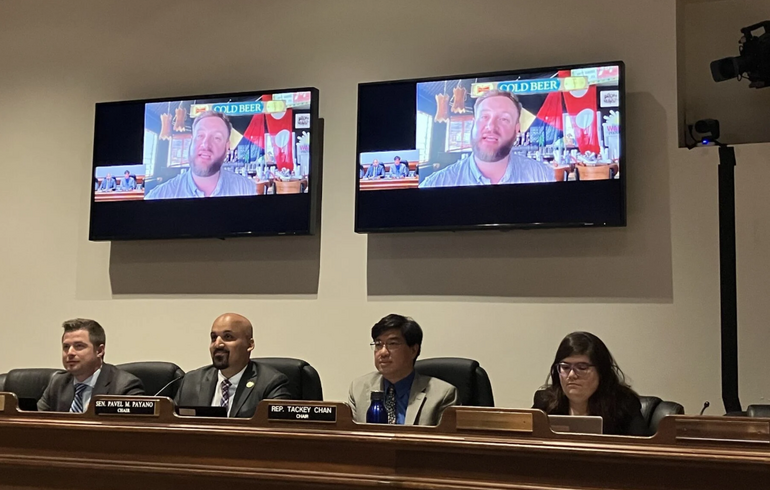Senator pitches happy hour bill as restaurants, package stores unite in opposition
 Photo | Courtesy of Alison Kuznitz, State House News Service
Sen. Julian Cyr testifies virtually on his happy hour bill from Provincetown Brewing Co. during a Joint Committee on Consumer Protection and Professional Licensure hearing on Monday, as co-chairs Sen. Pavel Payano and Rep. Tackey Chan listen from the State House.
Photo | Courtesy of Alison Kuznitz, State House News Service
Sen. Julian Cyr testifies virtually on his happy hour bill from Provincetown Brewing Co. during a Joint Committee on Consumer Protection and Professional Licensure hearing on Monday, as co-chairs Sen. Pavel Payano and Rep. Tackey Chan listen from the State House.
With a "cold beer" sign as his backdrop from a Provincetown brewery, Sen. Julian Cyr made his latest pitch Monday morning to repeal the state's happy hour ban, as lobbyists representing restaurants and package stores balked at the prospect of drink promotions cutting into their bottom lines.
Cities and towns would have the option to offer happy hour promotions for alcoholic beverages during specific time windows under proposals from Cyr and Rep. Samantha Montaño (S 217 / H 443). Happy hour has been banned in Massachusetts since 1984, as officials sought to alleviate drunk driving.
"I'm actually testifying at the Provincetown Brewing Company here in Provincetown, one of the many businesses in my district, the Cape and Islands district, who are clamoring for and asking for the ability to get more business through their doors," Cyr told the Joint Committee on Consumer Protection and Professional Licensure.
Under newly adopted joint rules, Cyr faced no pushback to testify virtually. In May as rules reforms were still being negotiated, committee co-chair Rep. Tackey Chan blocked Sen. Jake Oliveira from testifying virtually from his western Massachusetts district, a procedural maneuver that Senate President Karen Spilka knocked.
Chan cited the new rules at the end of the hearing Monday, as he rattled off a new poll for House members and his recommendations for bills that should receive a favorable report or be sent to study. Co-chair Sen. Pavel Payano then read the list of bills the committee had just heard.
Cyr's happy hour measure, which the Provincetown Democrat said can help boost profits and drive foot traffic to small and family-owned businesses, has repeatedly failed to clear the Legislature. The Senate last session incorporated Cyr's local-option happy hour provision into its economic development bond bill, which did not survive conference committee negotiations with the House.
"Our small businesses, our restaurants, our bars are really struggling in the aftermath of the COVID-19 pandemic," Cyr said. "And Massachusetts continues to be only one of eight states that continue to prohibit happy hour drink specials."
Cyr, who's vice chair of the Public Health Committee, said his legislation, dubbed "an act relative to conviviality and downtown revitalization," would create "safe and responsible happy hour practices." Drinks could not be discounted after 10 p.m., drink prices could not change throughout happy hour, and businesses must provide at least three days' notice ahead of happy hour specials. The bill does not limit the extent of drink discounts.
"The landscape has changed dramatically since 1984 when the happy hour ban was put in place," Cyr said. "We have since implemented strict penalties, enforced the national drinking age, mandated seat belt laws and witnessed the rise of ridesharing services that have really helped Massachusetts have one of the lowest rates of drunk driving in the country."
The Massachusetts Restaurant Association, which represents more than 1,800 restaurants, opposes any legislation that would change the status quo around the happy hour ban, said Jessica Moore, MRA's director of government affairs. She said that also includes a Rep. Mike Connolly bill (H 349) that would create a special commission to evaluate repealing the happy hour ban.
Moore, who contended the ban is "working and should be left alone," lamented that restaurants are grappling with "razor-thin margins" that are exacerbated by inflation and steep credit card processing fees.
She warned the already competitive restaurant industry could end up facing more challenges, and competition could also emerge between neighboring municipalities with different happy hour approaches.
"If happy hour were allowed in desperation to gain market share, lower performing operators will discount more and more. The more they give away, the deeper the financial trouble -- the deeper the financial trouble, the more they will need to give away," Moore said.
She added, "More popular establishments with higher costs will find themselves competing with the bar across the street's predatory pricing policies. There is no protection for restaurants that have no interest in participating. Once one establishment opens the door, every other operator in the city or town will be forced to follow."
Cyr, who testified after Moore, responded that Massachusetts still operates in a "semi-free market," as he advocated in support of giving businesses more tools to attract customers.
"I can tell you in my neck of the woods, we probably wouldn't offer happy hour here at the Provincetown Brewing Company in July and August. It's just so busy," Cyr said. "But for a place that wants to stay open year round -- for a place that keeping your doors open year-round here is tremendously difficult -- the proprietors of this business would love the ability to have a happy hour, say on Sundays in the off-season, from November to April."
The Massachusetts Package Stores Association also opposes reinstating happy hour, said Robert Mellion, the group's executive director and general counsel.
"We stand with MRA in strong opposition to any bill that discounts alcohol for sale in our state," Mellion said. "I think it's important that the two associations representing on- and off-premise are against discounted alcohol."
As a workaround to drink specials, some Massachusetts restaurants and bars offer happy hour deals on food. But Cyr, citing personal experience working at his family's seasonal restaurant on Cape Cod, pointed out the cost of food and labor are the biggest expenses for restaurants.
"If you're trying to get people in the door with a discount on food -- say, I don't know, oysters or chicken wings, you name -- the amount of labor and time that it takes to purchase that food, to shuck those oysters, to fry those chicken wings is quite costly," Cyr said.
Meanwhile, Cyr said, alcohol represents the highest margin for a restaurant or bar, with markups around six to eight times the cost.
"That's where the margin is, and that's why we've actually seen businesses around the country, and in Massachusetts before 1984, offer happy hour," Cyr said. "Because this is something that, unlike other inputs, you can discount to get people in the door. Alcohol, beer, wine, liquor doesn't actually affect your bottom line, certainly as much as others."








0 Comments